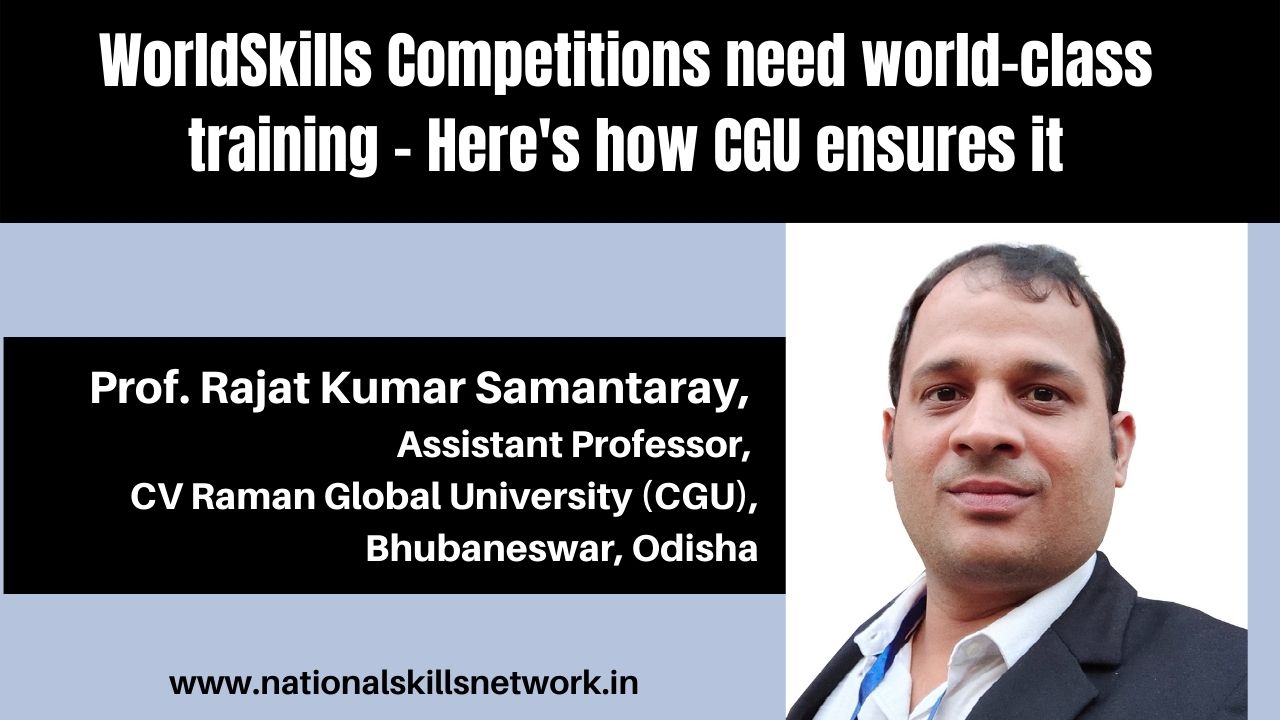Effective training and experienced trainers are two critical components of any champion’s success! CV Raman Global University, a pioneer in providing world-class technical training to students across India, is transforming the face of skills competition by fostering champions through its outstanding training and facilities. The university’s expert trainers provide students with all of the necessary skills and assist them in showcasing their abilities.
Team NSN spoke with Prof. Rajat Kumar Samantaray, Assistant Professor at CV Raman Global University who is also an expert trainer for WorldSkills participants, to learn more about the importance of training and coaching, new training methodologies, and the issues faced by students and trainers during the WorldSkills training.
Below are a few excerpts from our conversation. You can watch the full video on our YouTube channel.
Q. What is the importance and role of training and coaching for skills competitions?
A: In 2019, the first official skill was water technology. It has the most advanced models, including virtual reality, mechanical components, and more. To compete in world skills competitions, a student must comprehend all of these components.
World Skills began in 1945, however, India only began participating in the competition in 2011. While the level of engagement was initially low, it increased in 2019. Along with water technology, world skills have 56 different abilities in six primary sectors, including information technology, construction and building technology, and water technology, which is part of the manufacturing sector.
Students can select a skill set and practise it as needed. Competitors must comprehend basic requirements such as technical disruptions, curriculum, and test projects in addition to mastering skills. We are developing 30 skills at CGU for the upcoming competitions, for which a team is working.
Q. How do we ensure the training and infrastructure meet global standards?
A: Infrastructure is necessary for a contestant to compete in a skills competition. We have a set of rules called the World Skills Occupation Standard, which we adhere to. There is also a community that creates the infrastructure and a layout for competitions, as well as safety measures and specialised tools. To handle the competition, one must manage stress and time.
Q. Does CGU organize any rehearsals or mock competitions before the final competition?
A: During their preparation, students go through three levels of training. They are taught the skills necessary to compete in WorldSkills at the first level. In the second level, they participate in practise sessions that are not timed. We also organize mock competitions for the participants at the third level. At CGU, we also keep track of the participants’ errors and progress graphs, allowing us to tailor the training to their specific needs.
 Q. How do the students manage the rigorous training for the competitions along with their regular curriculum?
Q. How do the students manage the rigorous training for the competitions along with their regular curriculum?
A: As students are already from engineering and diploma backgrounds, they already have the required academic knowledge. Apart from that, we also have 25 Centres of Excellence (CoEs) in which six hours are spent for the credit course in skill development. Competitors put in extra time and effort to achieve victory.
Q. Tell us about your experience of training the students for WorldSkills competitions.
A: Experience is extremely valuable and learning new skills can change a person’s life. The skills competitions have provided me with an opportunity to learn many new skills and also helped me gain relevant experience. I was the team leader for Odisha in the IndiaSkills 2018. During that time I got a chance to deeply interact with the participants and understand the challenges that they go through. We are now preparing for WorldSkills Shanghai for which we have created a forum and staying in touch to discuss various aspects of the preparation and training.
Q. How is the response of parents when it comes to the skills competition?
A: Parents were first hesitant to send their children to skills competitions because they are not a part of their formal education. However, after seeing the success of other competitors on a national and international level, they began to embrace the concept of sending their children to the tournament. The face of skills competition is changing, at least in Odisha, as a result of growing participation and overwhelming response, and the government has established numerous divisions such as the Odisha Skill Development Authority (OSDA) and initiatives to help students learn the necessary skills.
Q. What are the challenges that the students usually face during the training? How should the trainers cope with the challenges?
A: The pandemic’s enormous outbreak had an influence on students’ hands-on training, which is an important aspect of their preparation. We provided practical training through virtual mediums to ensure continuous skill development and training, which proved to be a challenge for both students and trainers. As the situation improves, we have restarted our physical labs, where the students have begun their preparations for the upcoming event.
Also read: Exemplary performance by CV Raman Global University students in Odisha Skills 2021 https://nationalskillsnetwork.in/exemplary-performance-by-cv-raman-global-university-students-in-odisha-skills-2021/
Q. Is there anything else you wish to share with our audience?
A: I would advise participants to prepare themselves as per the international standards, even if they are competing at the regional or state level. This will assist in dealing with stress and time constraints during the final WorldSkills competitions.














Comments 1